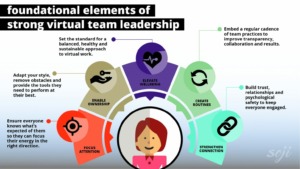Managing a remote team can be rewarding, but it also presents unique challenges. From miscommunication to feelings of isolation, these can hinder productivity and team spirit. But fear not! With the right virtual team management strategies, you can overcome these remote team challenges and build a high-performing virtual team. Ubiminds can help!
1. Conquering Communication Silos: Bridging the Gap in Remote Teams
Miscommunication is a frequent challenge in virtual teams due to the lack of face-to-face interaction. Without visual cues like body language or tone of voice, messages can be misunderstood or misinterpreted. This can lead to confusion, errors, and even conflict within the team.
Solutions and Best Practices:
- Clear and Concise Communication: Encourage team members to be clear and concise in their written communications. Avoid using jargon or ambiguous language that could be misunderstood.
- Use Video Calls for Important Conversations: Video calls can help convey tone and body language, reducing the likelihood of miscommunication. Tools like Zoom or Microsoft Teams can be particularly effective for this.
- Regular Check-Ins: Hold regular team meetings and one-on-ones to ensure that everyone is on the same page. This also provides opportunities to clarify any misunderstandings.
2. Combating Cabin Fever: Fostering Connection in Your Virtual Team
Remote work can lead to feelings of isolation, as team members may miss the social interactions of a traditional office. This sense of disconnection can affect morale, collaboration, and overall productivity.
Solutions and Best Practices:
- Virtual Social Events: Organize virtual team-building activities, such as online games, coffee breaks, or happy hours. This helps to foster a sense of community and keep team members connected.
- Open Communication Channels: Use communication platforms like Slack or Microsoft Teams to create informal channels where team members can chat about non-work-related topics. This mimics the “water cooler” conversations that happen in an office.
- Buddy System: Implement a buddy system where team members are paired up to check in on each other regularly. This can help reduce feelings of isolation and provide a support system within the team.
3. Keeping Morale High When Working Remotely: Strategies for Success
Keeping team morale high can be challenging in a virtual environment, especially when team members are dealing with remote work-related stress, lack of social interaction, or the pressures of balancing work and home life.
Solutions and Best Practices:
- Recognition and Appreciation: Regularly recognize and celebrate team members’ achievements, both big and small. This can be done through shout-outs in meetings, virtual awards, or even sending a small gift.
- Support Work-Life Balance: Encourage team members to set boundaries between work and personal time. This can be supported by flexible working hours and promoting the use of PTO.
- Provide Growth Opportunities: Offer opportunities for professional development, such as online courses, webinars, or mentorship programs. This not only boosts morale but also enhances the team’s skill set.
Bonus: Tools to Thrive in Virtual Team Management
To effectively manage a remote team, leveraging the right tools is essential. Here are some key tools to consider:
-
Communication Platforms:
- Slack: A popular team messaging app for real-time communication and collaboration.
- Microsoft Teams: A comprehensive platform for communication, collaboration, and file sharing.
- Zoom: A leading video conferencing tool for virtual meetings and team interactions.
-
Project Management Tools:
-
Time Tracking Tools:
- Toggl: A simple and efficient time tracking tool to monitor productivity and identify time-consuming tasks.
- RescueTime: Automatically tracks time spent on different applications and websites to help you understand your productivity patterns.
-
Document Collaboration Tools:
- Microsoft Office 365: A suite of tools for document creation, editing, and collaboration.
- Google Workspace: A suite of tools for communication, collaboration, and productivity.
-
Employee Recognition Tools:
Use them to streamline your remote team management processes, improve communication, and enhance overall productivity.

Virtual team leadership brings it’s own challenges – some with simple solutions. Infochart by Soji.
Beyond the Basics: Advanced Techniques for Remote Team Management
While the tools and strategies mentioned above are essential for remote team management, there are additional advanced techniques to consider:
- OKR (Objectives and Key Results): Implement OKRs to set clear goals and track progress.
- Remote Team Retreats: Organize virtual or in-person retreats to foster team bonding and alignment.
- Continuous Learning and Development: Invest in training and development opportunities for your team members.
- Employee Engagement Surveys: Regularly assess team morale and identify areas for improvement.
- Remote Work Policies: Establish clear policies and guidelines for remote work to ensure consistency and fairness.
Take on these advanced techniques to further enhance your remote team management practices and drive success. You can also check out other best practices in building high-performing distributed teams here.
FAQ for “Remote Team Management Challenges
-
Q: How can I prevent miscommunication in my remote team?
A: Encourage clear communication, use video calls for important conversations, and hold regular check-ins. -
Q: How can I combat feelings of isolation in my remote team?
A: Organize virtual social events, create informal communication channels, and implement a buddy system. -
Q: How can I maintain high morale in my remote team?
A: Recognize achievements, promote work-life balance, and offer opportunities for growth.

International Marketing Leader, specialized in tech. Proud to have built marketing and business generation structures for some of the fastest-growing SaaS companies on both sides of the Atlantic (UK, DACH, Iberia, LatAm, and NorthAm). Big fan of motherhood, world music, marketing, and backpacking. A little bit nerdy too!





